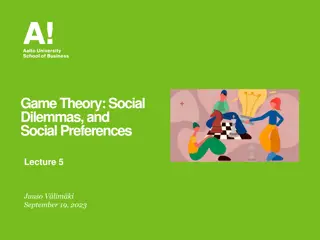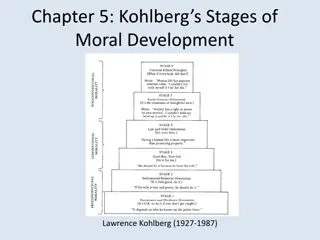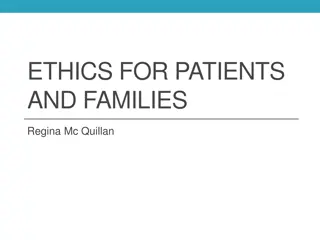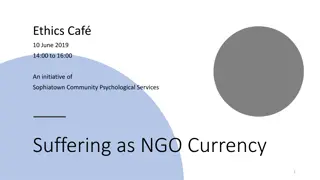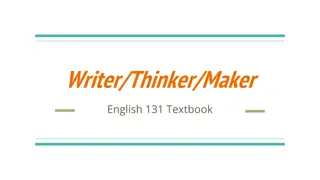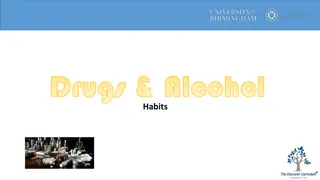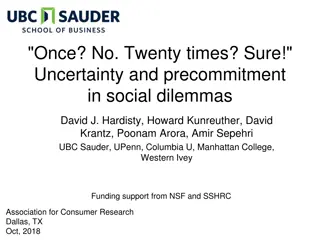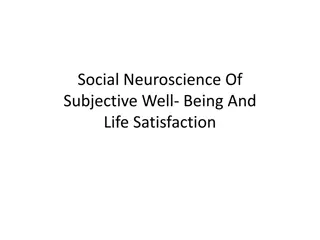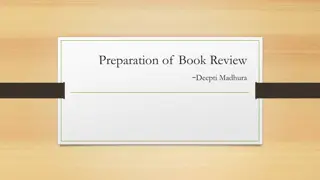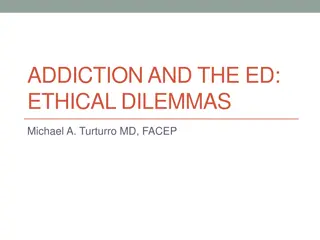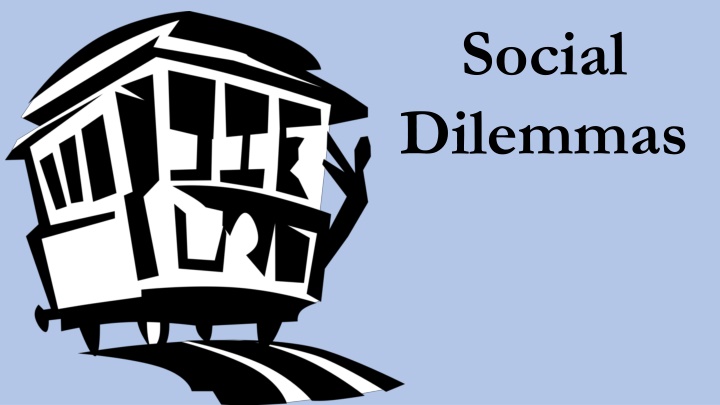
Social Dilemmas and Cooperation: Insights and Neurochemistry
Explore concepts like Tragedy of the Commons, Prisoner's Dilemma, and the Chemical Basis for Trust, alongside the impact of expectations, sanctions, and self-interest in fostering cooperation. Discover how neurochemistry influences our inclination towards cooperation and the role of trust in public goods games.
Download Presentation

Please find below an Image/Link to download the presentation.
The content on the website is provided AS IS for your information and personal use only. It may not be sold, licensed, or shared on other websites without obtaining consent from the author. If you encounter any issues during the download, it is possible that the publisher has removed the file from their server.
You are allowed to download the files provided on this website for personal or commercial use, subject to the condition that they are used lawfully. All files are the property of their respective owners.
The content on the website is provided AS IS for your information and personal use only. It may not be sold, licensed, or shared on other websites without obtaining consent from the author.
E N D
Presentation Transcript
Social Dilemmas
Self-Interest Interest of Others
Tragedy of the Commons Sharing a Limited Resource Water, food resources, air, etc. Usually people share resources by limiting their own usage of a limited resource But tragedy occurs when people consume more than their share, putting the group at a disadvantage CLICK HERE for a clip on Tragedy of the Commons
Prisoners Dilemma Best individual outcome Best group outcome
Public Goods Game Best strategy for maximizing gains: Tit-for-tat Start out cooperating, then do what the other person does Based on fairness and reciprocity
Neurochemistry of Cooperation Cooperating activates reward centers in the brain fMRI Studies: The brain showed activation in : Nucleus accumbens Ventral caudate Orbitofrontal Cortex
Defection vs Cooperation Individual Differences: Attachment Style More secure individuals cooperate more More trust in other people Cooperative vs competitive orientation Competitive people: bad is stronger than good Being an older sibling More cooperation
Expectations for Trust & Cooperation: A Self-Fulfilling Prophecy Expect Cooperation Others Reciprocate Act in Cooperation
The Role of Sanctions on Cooperation First round of the game (Situation A) Two conditions: Sanction for defection: The two members who donated the least would be fined about $7 No sanction for defection Second round of the game (Situation B) No sanction for defection Does cooperation change when sanctions are removed? It decreases!
Chemical Basis for Trust Oxytocin is associated with greater trust in the Trust Game
The Role of Self-Regulation High-Level Action Identification Sensitive to collective good Greater self-control Low-Level Action Identification Sensitive to personal needs Less self-control Lack of awareness about how individual actions influence the common good
Justice Do people get what they deserve? Is the system just?
Revenge When people feel they have been Cheated Betrayed Lied to Taken advantage of In order to restore fairness Vengeful acts Getting back at someone An eye for an eye Implications for the judicial system
Belief in a Just World People get what they deserve & deserve what they get. When you cannot justify why a tragedy occurred, some turn to the victim Victims of natural disasters Derogation of crime victims
For an overview of a Belief in a Just World CLICK HERE


